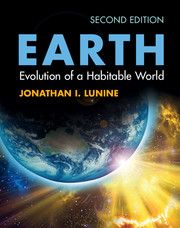Book contents
- Frontmatter
- Contents
- Preface
- Part I The astronomical planet: Earth's place in the cosmos
- Part II The measurable planet: tools to discern the history of Earth and the planets
- Part III The historical planet: Earth and solar system through time
- Part IV The once and future planet
- 21 Climate change over the past few hundred thousand years
- 22 Human-induced global warming
- 23 Limited resources: the human dilemma
- 24 Coda: the once and future Earth
- Index
- Plate section
23 - Limited resources: the human dilemma
from Part IV - The once and future planet
Published online by Cambridge University Press: 05 June 2013
- Frontmatter
- Contents
- Preface
- Part I The astronomical planet: Earth's place in the cosmos
- Part II The measurable planet: tools to discern the history of Earth and the planets
- Part III The historical planet: Earth and solar system through time
- Part IV The once and future planet
- 21 Climate change over the past few hundred thousand years
- 22 Human-induced global warming
- 23 Limited resources: the human dilemma
- 24 Coda: the once and future Earth
- Index
- Plate section
Summary
Security is mostly a superstition. It does not exist in nature, nor do the children of men as a whole experience it.
HELEN KELLERIntroduction
Only in the last century has humanity's command of technology and energy made it possible to feel a sense of security unknown for most of human history. And yet, ironically, this new sense that we can obtain and control what we need to make life lengthy and of high quality comes just as we find ourselves depleting what were once thought to be virtually inexhaustible resources. As our numbers grow, how will humankind continue to sustain the industrialized civilization that has made high standards of living – or the aspiration for such standards - a staple theme of the last century? This chapter addresses briefly the issues of future supplies of food, energy, and material resources.
The expanding human population
Population growth is the root cause of human-induced global warming and depletion of non-renewable resources. From the beginning of humankind to just over 100 years ago, the world's human population was less than one billion. Our planet now holds nearly 7 billion persons thanks to medical advances and growth in agricultural productivity throughout the twentieth century. The growth rate will take us to just over 9 billion by the middle of this century. The net increase in population over the last decade amounts to about 150 million people a year.
- Type
- Chapter
- Information
- EarthEvolution of a Habitable World, pp. 287 - 298Publisher: Cambridge University PressPrint publication year: 2013



